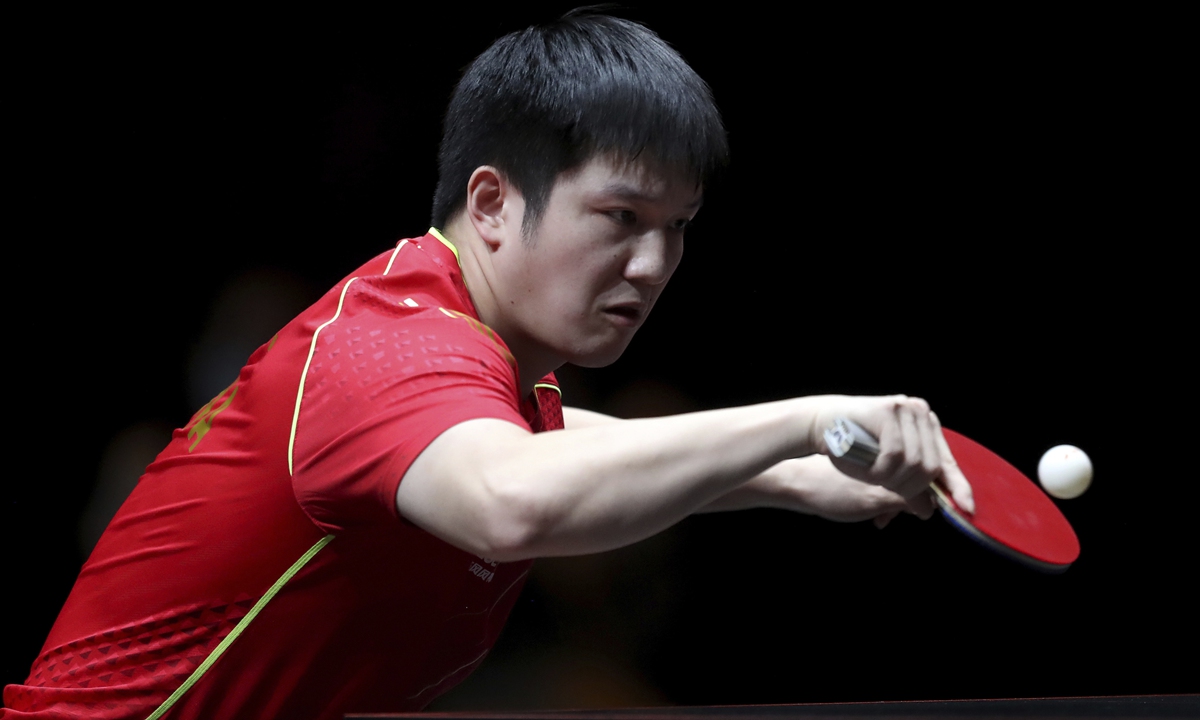
Fan Zhendong returns to Japan's Tomokazu Harimoto during the final in the World Table Tennis Cup Finals in Singapore on December 7, 2021. Photo: VCG
The General Administration of Sport of China (GAS) urged all parties within the national sports industry to resolutely resist the erosion of the sports sector by toxic fandom culture during a working conference held in Guangzhou, South China's Guangdong Province, on Wednesday.
"Everyone must raise their awareness of the detrimental impact that toxic fandom culture has on the physical and mental health of athletes, national sports teams' capability to bring glory to the country, as well as the sustainable development of the sports industry," Gao Zhidan, director of the GAS, said.
Sports should not, and cannot, become a "breeding ground" for the continued proliferation of distorted fandom culture. It's imperative to address this issue, and the national sports sector must be highly vigilant and take swift action, Gao said.
As the Paris Olympic Games approach, building a healthy fandom culture in China's sports sector and fostering a sensible viewing vibe for the Paris Games is essential for the well-being of athletes, the promotion of national pride, the encouragement of sportsmanship, the promotion of participation in sports, and leaving a positive legacy for future generations.
Addressing toxic fandom culture requires concerted efforts from sports organizations, media, and fans themselves to create a more positive and supportive environment for athletes.
Distorted fandom culture refers to the irrational support and consumption of fanatical fans for their idols. They not only indiscriminately invade the lives of idols, probing into their privacy, but also impose their own will on the athletes. As they go to extremes to antagonize fans of other celebrities, their conduct affects athletes' public image and wastes public resources.
China's table tennis star Fan Zhendong took to his personal social media account in March to urge fans to stop violating his privacy after someone allegedly disseminated his personal ID number on the internet, seriously violating his rights to privacy.
During this year's two sessions, Yang Yang, China's first Winter Olympic champion and a member of Chinese People's Political Consultative Conference (CPPCC) National Committee, warned about the dangers of athletes experiencing excessive scrutiny and pressure resulting from extreme idolization, highlighting the potential adverse effects on mental health.
This overwhelming harassment puts immense pressure on athletes, which can lead to increased stress levels, anxiety, and mental health issues, affecting their athletic performance and overall well-being.
Constantly having to deal with paparazzi-like scrutiny and criticism from fans can erode their ability to concentrate on their performance and improvement. Toxic fandom can also negatively influence younger athletes who look up to their sports idols. If they see their role models scrutinized by fans, it may discourage them from pursuing their own athletic aspirations.
In November, the Chinese Olympic Committee issued a statement on its official website emphasizing the need to stop the spread of toxic fandom culture within the sports community and calling on Chinese athletes not to organize or participate in fan communities or initiate related discussions.
Maintaining social distance while cheering for athletes in a sensible manner is the most effective way to support both the athletes and China's sports endeavors.
In April, the internet illegal information reporting center of South China's Guangxi Zhuang Autonomous Region launched a dedicated section on its website for people to report issues related to toxic idolization in sports.
The online platform was designed to address reports regarding the exposure of athletes' privacy, interference with their normal training and competitions, as well as conflicts and verbal abuse among fans.
Cultivating an orderly and rational fandom culture requires collaborative efforts from all participants in the sports sector. A healthy fandom culture promotes sportsmanship and fair play and emphasizes the values of respect, integrity, and camaraderie among athletes and fans alike. This contributes to a more positive and inclusive sporting environment.
The author is a reporter with the Global Times. life@globaltimes.com.cn




